This article contains spoilers for Mission: Impossible – Dead Reckoning Part One in its discussion of how the movie humanizes both Ethan Hunt and Tom Cruise.
There is something interesting in how Mission: Impossible – Dead Reckoning Part One approaches the past of international superspy Ethan Hunt (Tom Cruise). For the first time ever, the Mission: Impossible franchise acknowledges that Ethan Hunt has a past.
Hunt has always been something of a blank slate as a character, capable of being whatever the films (or perhaps even Tom Cruise) need him to be in a given moment. Hunt can reinvent himself from one movie to the next. It’s hard to believe that the buttoned-down operative from Mission: Impossible is the same long-haired thrill seeker from Mission: Impossible 2 or the domesticated husband of Mission: Impossible III. Hunt has always been more of an abstraction than a character.
This has been particularly true in the wake of Mission: Impossible III. The attempt to reinvent Hunt as a loving husband, which (coincidentally or not) overlapped with Cruise’s efforts to be more open about his own romantic life and his religious beliefs, was a disaster. The movie underperformed. Paramount severed its 14-year relationship with Cruise, with one Viacom board member lamenting that Cruise had “gone nuts.” It seemed like the public didn’t want to truly know Hunt or Cruise.
Perhaps in response to this, the subsequent movies put a distance between Hunt and the audience. It seemed like Hunt had no life or personality outside of the films themselves. They would often open in such a way as to suggest that Hunt had simply been in hibernation between installments of the long-running series, dormant and waiting for a moment when a suitably impossible mission might present itself to him.
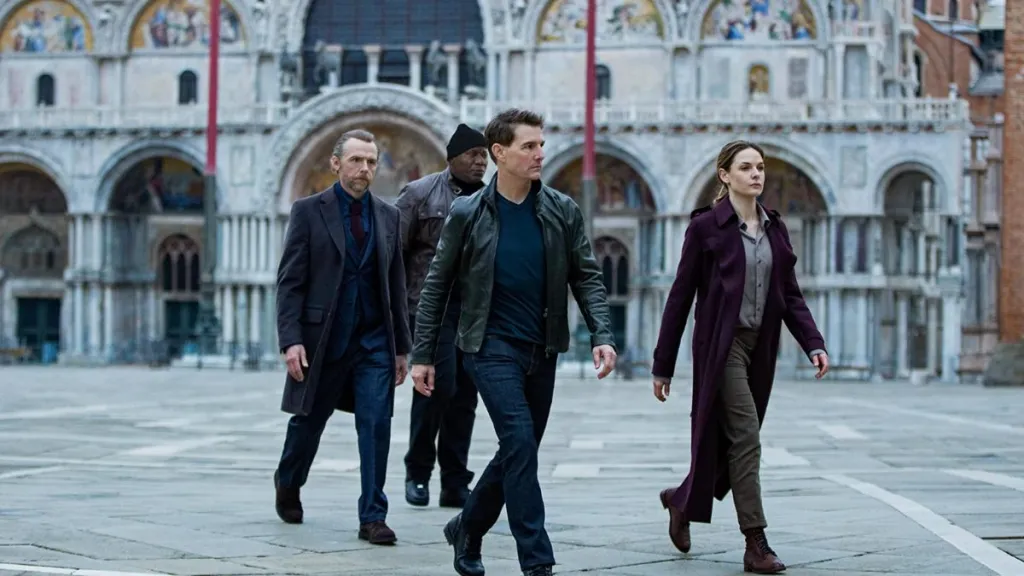
In Mission: Impossible – Ghost Protocol, Hunt is introduced in a Russian prison, perhaps a visualization of Cruise’s time in “movie jail.” Just the previous year, Forbes had noted that his career had “been rocky lately” while The Guardian opined that he has “suffered a steep, nosebleed-inducing depreciation.” However, in one of the series’s true movie-star moments, Hunt waltzes out of captivity to the tune of Dean Martin’s “Ain’t That a Kick in the Head?”
Mission: Impossible – Rogue Nation introduces Hunt in action, sprinting into view with that trademark Tom Cruise run. At the start of Mission: Impossible – Fallout, Hunt is hiding out in a safehouse in Belfast, sleeping on a rough bunk. Hunt makes his first appearance in Mission: Impossible – Dead Reckoning Part One literally stepping out of the shadows inside an empty and derelict safe house. There’s something ethereal about all this. There’s no sense that Hunt has any meaningful human life outside of these impossible missions.
Hunt conjures himself into being whenever he is needed and then drops out of existence once the task is complete. Ghost Protocol literalizes this idea. At the end, Hunt literally walks into the distance and disappears in a puff of smoke. This all feels like something of a reaction to Cruise’s very public fall from grace, an attempt to reestablish a sense of distance and mystery between a movie star and his audience. Hunt is an abstraction, a spirit, a phantom. This was perhaps also true of Cruise; around this time, journalists were told not to ask about his personal life in promotional interviews.
Even as Hunt seemed to fade away, he became more an avatar of Cruise. Much of the publicity around the Mission: Impossible films places an emphasis on Tom Cruise’s performance of the stunts that Ethan Hunt executes on screen. Cruise has climbed the Burj Khalifa, clung to the outside of an airplane during take-off, flown a helicopter, rode a motorbike off a cliff, and snapped his ankle, all in tandem with Hunt. There is a minimum amount of distance between the star and character.

Hunt’s single-minded fixation finds a mirror in Cruise. In Rogue Nation, CIA Director Alan Hunley (Alec Baldwin) describes Hunt as “the living manifestation of destiny.” This doesn’t feel too far removed from the persona that Cruise has cultivated around himself, a movie star who has managed to endure for decades on sheer force of will. After years as a rogue agent, Hunt now operates without oversight. Cruise has gone through a similar arc with Paramount, once disavowed, now dominant.
To be clear, this overlap between actor and character doesn’t have to be intentional or even direct. Barbie director Greta Gerwig has talked about how “part of the joy of making art for people, is sometimes they understand it more than you do, which is unsettling,” while Oppenheimer director Christopher Nolan contends that “[s]elf-consciousness is death to a filmmaker.” Still, given Cruise’s decades-long association with Hunt, the blurring of boundaries between the two was inevitable.
In the two most recent Mission: Impossible films, and Top Gun: Maverick, there is a sense that Cruise is beginning to feel more comfortable embracing and acknowledging his humanity, rather than presenting himself as an abstract force. Mission: Impossible – Fallout finds Hunt acknowledging that he wasn’t the best husband to Julie and making peace with that. It plays as a tacit acknowledgement of the controversies around Cruise’s own divorces.
As he has gotten older, and perhaps as his stardom has become more secure, Cruise has allowed the Mission: Impossible movies to dabble in ideas that evoke his own storied personal life. Fallout makes a point to build its opening scenes around an attack on global religious institutions, while Dead Reckoning casts its villainous artificial intelligence as a demonic “Entity” with its own “dark messiah,” Gabriel (Esai Morales). Cruise’s own religious beliefs are a long-standing source of controversy.
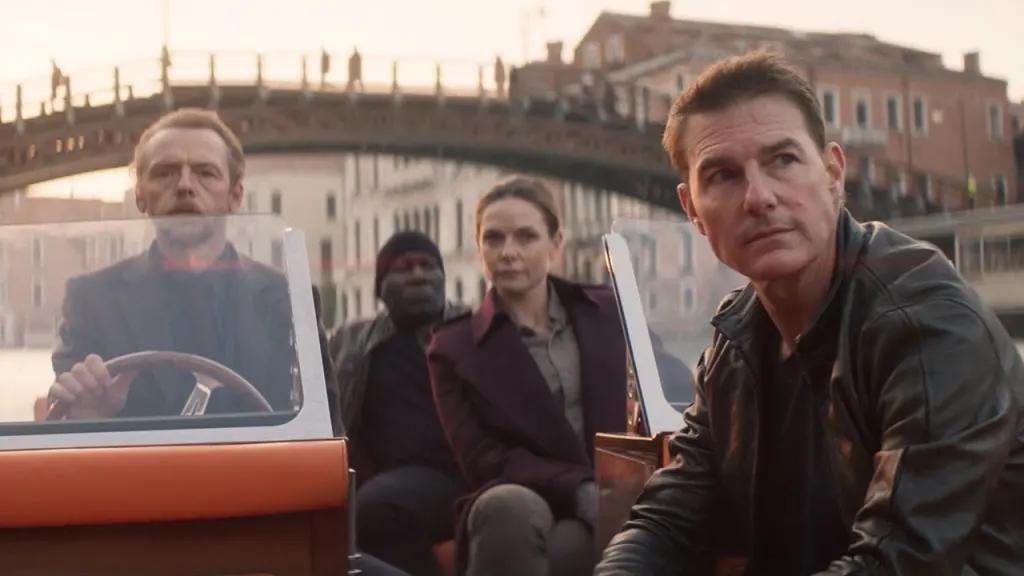
There is no elegant way to say this: Dead Reckoning Part One is a surprisingly horny movie. This is a film that uses the word “mate” as both a noun and a verb during expository dialogue about the interlocking cruciform key that is the movie’s MacGuffin. Evoking Eyes Wide Shut, Hunt infiltrates a party where Alanna Mitsopolis (Vanessa Kirby) must pick her “suitor.” The climax of the movie even features a speeding train powering through a tunnel, one of the great cinematic metaphors.
This energy doesn’t feel too far removed from Brian De Palma’s Mission: Impossible, which features a tense conversation in which Hunt’s boss, Jim Phelps (Jon Voight), heavily implies that he is perfectly fine with the spy sleeping with his wife Claire (Emmanuelle Béart). It also isn’t quite as absurdly heightened as the very weird vibe coursing through Mission: Impossible 2, with its “chicken-shit misogynism” and overt castration anxiety. Still, it marks a departure from the intervening films.
Much of this tension focuses on the new character, Grace (Hayley Atwell), a pickpocket drawn into Ethan’s orbit. In the film’s best action beat, the pair end up handcuffed together and driving around Rome in a Fiat 500. It is as much a screwball comedy sequence as a high-stakes chase. At one point, Ethan struggles to start the car, feeling performance anxiety. Later, the car is knocked over and Ethan and Grace’s bodies tumble over one another.
In the world of Dead Reckoning Part One, there are only two women, each of whom is doubled within the narrative. There is the Hitchcockian bleached blonde ice queen who will inevitably betray her allies, represented by both Alanna Mitsopolis and the mysterious Paris (Pom Klementieff). There is also the sweet innocent brunette that Hunt feels compelled to save, represented by Grace and his old ally Ilsa Faust (Rebecca Ferguson). Ilsa’s death makes Ethan more protective of Grace.
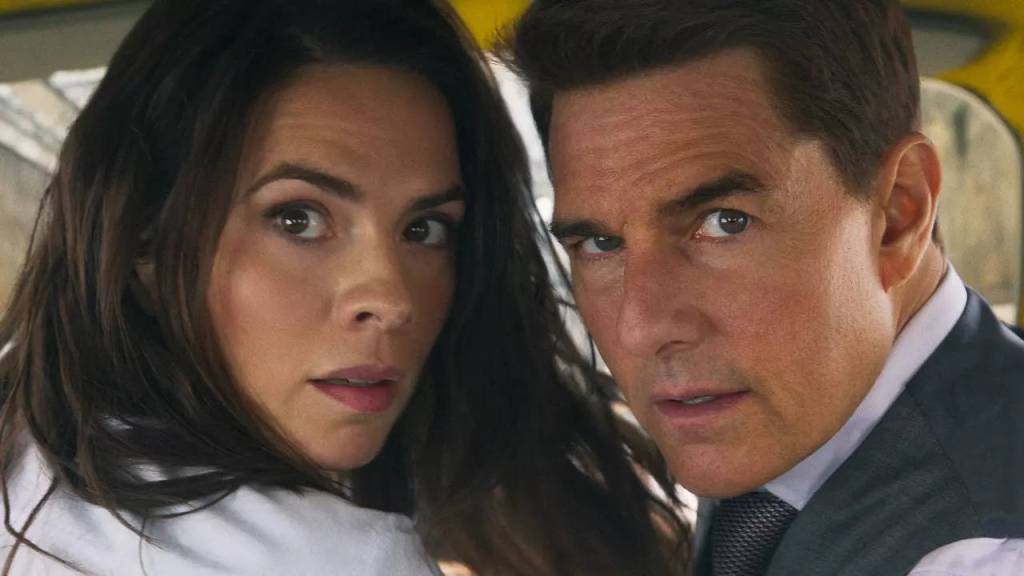
This is where the movie becomes particularly interesting as a romantic and personal narrative. After Ilsa is murdered by Gabriel, Grace finds herself sitting in a room surrounded by Ethan and his two closest friends, Luther (Ving Rhames) and Benji (Simon Pegg). In that room, the trio offer Grace “the choice.” They ask her to join their task force. Given the religious subtext that permeates the movie, it is very transparently a conversion narrative.
Hunt sees the Impossible Mission Force as a vocation. The film is about embracing that vocation. In his first scene, Hunt talks a new recruit (Alex James-Phelps) through a simple handover. At the end, he assures him, “Welcome to the IMF. You made the right choice.” That briefing is from Hunt’s old professional adversary Eugene Kittridge (Henry Czerny), who reminds Hunt that he took his own vow three decades earlier. This is the first time the series has truly acknowledged Hunt’s life before this.
That vow was one of atonement, offering Hunt the opportunity for redemption from a previously unmentioned wayward youth. “Your country has forgiven you,” Kittridge assures Hunt, “but we have not forgotten.” Flashbacks suggest that Hunt was involved in some horrific event involving Gabriel that led to the death of another innocent brunette, Marie (Mariela Garriga). Hunt’s vow to serve the Impossible Mission Force is a chance to make things right. Grace is another Ilsa, is another Marie.
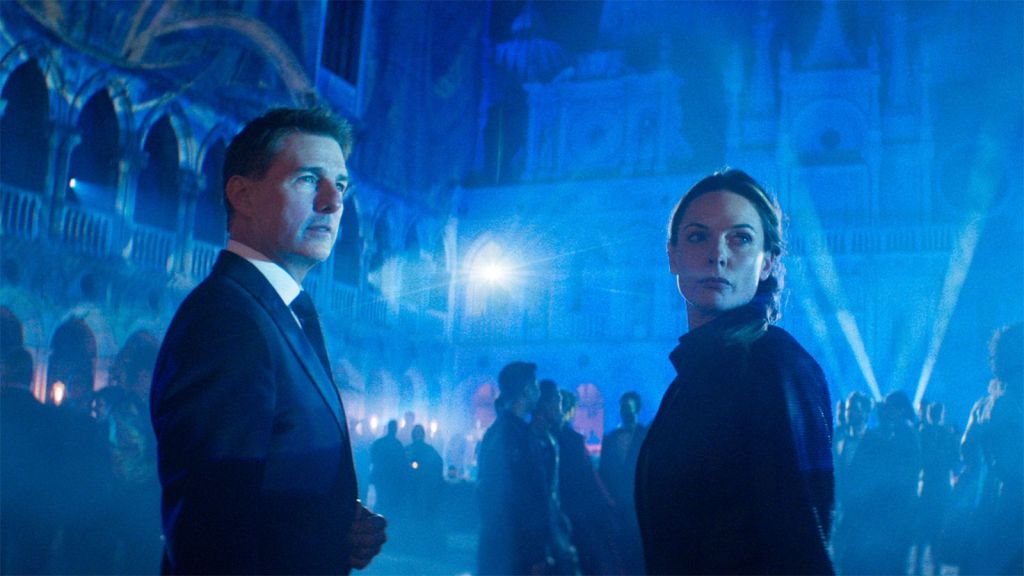
These sequences evoke certain aspects of Cruise’s storied personal life. There have been reports that the Church of Scientology “auditioned” potential girlfriends for Cruise, with women like Anette Iren Johansen and Nazanin Boniadi cited as examples. “When do I get my life back?” Grace asks Luther and Benji. The unspoken answer is: never. She articulates the implication, “But if I stay, I’ll be safe?” It is very hard to leave. It is worth noting that Atwell has denied tabloid rumors of a relationship with Cruise.
The timeline of Hunt’s admission to the Impossible Mission Force as presented in Dead Reckoning lines up with Cruise’s public acknowledgement of his membership of Scientology in an interview with Barbara Walters in 1992. The religion, which Cruise attributes to his success, gives him a sense of purpose, but also authority. In Dead Reckoning, Kittridge explains the IMF answers to no one in the intelligence community, recalling Cruise’s statements about Scientology in an internal promotional video: “Why ask permission? We are the authorities.”
Perhaps these elements are intentional. Perhaps they are purely coincidental, a synchronicity between the plot of the movie and the private life of its star. Either way, their inclusion serves to remind the audience of the star behind the franchise in a way that these films haven’t done for years. They humanize Ethan Hunt and, in doing so, humanize Tom Cruise. He might be the living manifestation of destiny, but he’s also a complicated figure. Dead Reckoning lets that bleed in.

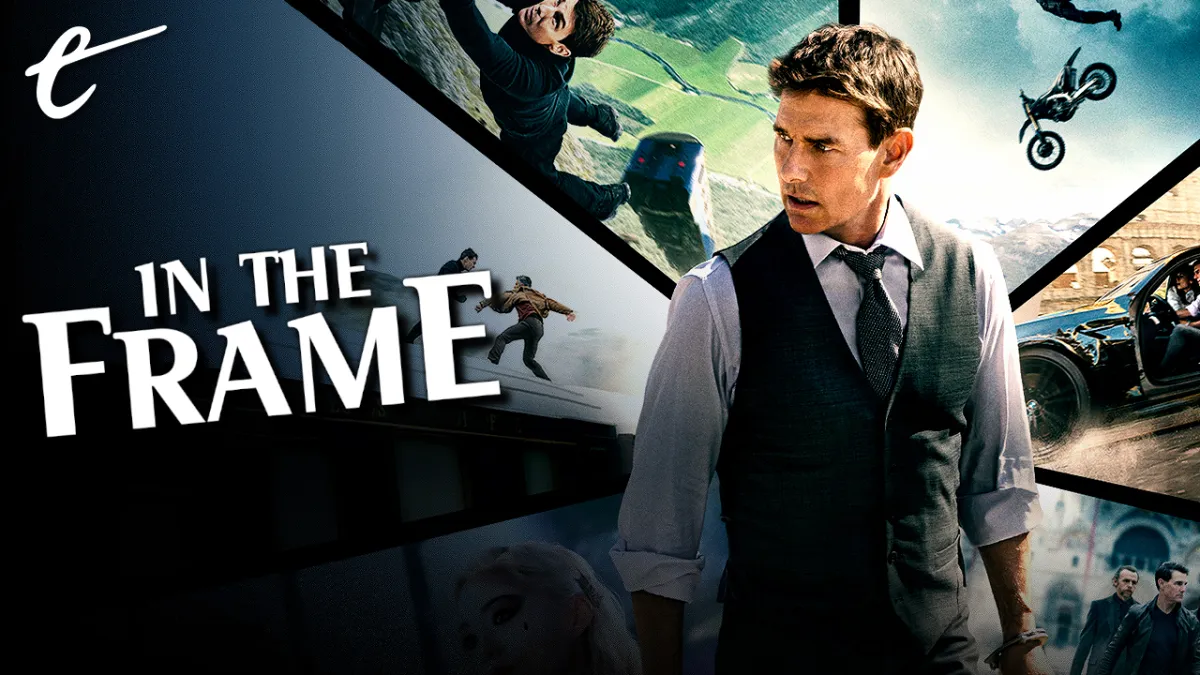




Published: Jul 17, 2023 11:00 am